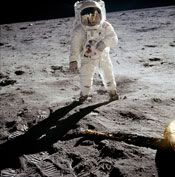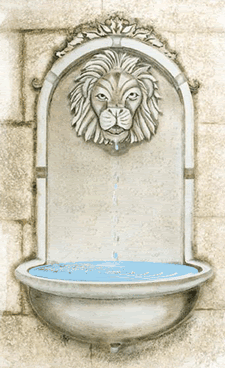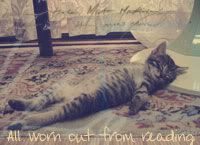Forms of Things Unknown
 As the truth dawned on him an excitement very different from that of terror seized him. He looked at their mis-shaped bodies; then down at his own limbs. Of course; that was what one looked like in a space suit. On his own head there was a similar monstrous globe, but fortunately not an opaque one. He was looking at three statues of spacemen: at statues of Trevor, Woodford, and Fox.
As the truth dawned on him an excitement very different from that of terror seized him. He looked at their mis-shaped bodies; then down at his own limbs. Of course; that was what one looked like in a space suit. On his own head there was a similar monstrous globe, but fortunately not an opaque one. He was looking at three statues of spacemen: at statues of Trevor, Woodford, and Fox.But then the Moon must have inhabitants; and rational inhabitants; more than that, artists.
And what artists! You might quarrel with their taste, for no line anywhere in any of the three statues had any beauty. You could not say a word against their skill. Except for the head and face inside each headpiece, which obviously could not be attempted in such a medium, they were perfect. Photographic accuracy had never reached such a point on earth. And though they were faceless you could see from the set of their shoulders and indeed of their whole bodies, that a momentary pose had been exactly seized. Each was the statue of a man turning to look behind him. Months of work had doubtless gone to the carving of each; it caught that instantaneous gesture like a stone snapshot.
Jenkin's idea was now to send his message once. Before anything happened to himself, Earth must hear this amazing news. He set off in great strides, and presently in leaps--now first enjoying lunar gravitation--for his ship and his own set. He was happy now. He had escaped his destiny. Petrified, eh? No more feelings? Feelings enough to last him forever.
He fixed the set so that he could stand with his back to the sun. He worked the gimmicks. 'Jenkin, speaking from the Moon,' he began.
His own huge black shadow lay out before him. There is no noise on the Moon. Up from behind the shoulders of his own shadow another shadow pushed its way along the dazzling rock. It was that of a human head. And what a head of hair. It was all rising, writhing--swaying in the wind perhaps. Very thick the hairs looked. Then as he turned in terror, there flashed through his mind the thought, 'But there's no wind. No air. It can't be blowing about.' His eyes met hers.
~C.S. Lewis, from the short story "Forms of Things Unknown" first published posthumously in Of Other Worlds, (1966) edited by Walter Hooper
________________________
On this day:
1922 C.S. Lewis sat by an open window and began writing his poem Dymer.
"It came in lecture-time one April morning
--Alas for laws and locks, reproach and praise,
Who ever learned to censor the spring days?
A little breeze came stirring to his cheek..."




0 Comment(s):
Post a Comment
<< Home